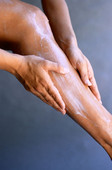- Could Artificial Sweeteners Be Aging the Brain Faster?
- Techniques for Soothing Your Nervous System
- Does the Water in Your House Smell Funny? Here’s Why
- Can a Daily Dose of Apple Cider Vinegar Actually Aid Weight Loss?
- 6 Health Beverages That Can Actually Spike Your Blood Sugar
- Treatment Options for Social Anxiety Disorder
- Understanding the Connection Between Anxiety and Depression
- How Daily Prunes Can Influence Cholesterol and Inflammation
- When to Take B12 for Better Absorption and Energy
- Epsom Salts: Health Benefits and Uses
Muscle Strength Fades After Just Two Weeks of Inactivity


It takes just two weeks of physical inactivity for those who are physically fit to lose a significant amount of their muscle strength, new research indicates.
In that relatively short period of time, young people lose about 30 percent of their muscle strength, leaving them as strong as someone decades older. Meanwhile, active older people who become sedentary for a couple weeks lose about 25 percent of their strength.
The more muscle a person has, the more they will lose if they are sidelined by an injury, illness or vacation, the Danish study found.
“Our experiments reveal that inactivity affects the muscular strength in young and older men equally. Having had one leg immobilized for two weeks, young people lose up to a third of their muscular strength, while older people lose approximately one-fourth. A young man who is immobilized for two weeks loses muscular strength in his leg equivalent to aging by 40 or 50 years,” researcher Andreas Vigelsoe, from the Center for Healthy Aging and the Department of Biomedical Sciences at the University of Copenhagen in Denmark, said in a university news release.
Total muscle mass normally declines with age. Young men have about two pounds more muscle mass in each leg than older men do. But, after two weeks of not moving at all the young men involved in the study lost 17 ounces of muscle, on average.
Older men, on the other hand, lost about nine ounces. However, all of the men lost physical fitness while their leg was immobilized, the study published recently in the Journal of Rehabilitation Medicine found.
“The more muscle mass you have, the more you’ll lose. Which means that if you’re fit and become injured, you’ll most likely lose more muscle mass than someone who is unfit, over the same period of time,” said Martin Gram, another researcher at the center, said in the news release.
“But even though older people lose less muscle mass and their level of fitness is reduced slightly less than in young people, the loss of muscle mass is presumably more critical for older people, because it is likely to have a greater impact on their general health and quality of life,” Gram said.
After being immobilized for two weeks, the men who participated in the study trained on a bike. They worked out three to four times a week for six weeks. Although this exercise helped the men regain physical fitness, the researchers found their muscle strength didn’t fully recover in that period of time.
“Unfortunately, bicycle-training is not enough for the participants to regain their original muscular strength,” said Vigelsoe. “Cycling is, however, sufficient to help people regain lost muscle mass and reach their former fitness level. If you want to regain your muscular strength following a period of inactivity; you need to include weight training.”
Gram said it was interesting how much muscle was lost due to inactivity, and pointed out that it takes about three times the amount of time you were inactive to get your muscle mass back.
More information
The U.S. Centers for Disease Control and Prevention provides more information on the benefits of physical activity.
Source: HealthDay
Copyright © 2026 HealthDay. All rights reserved.










